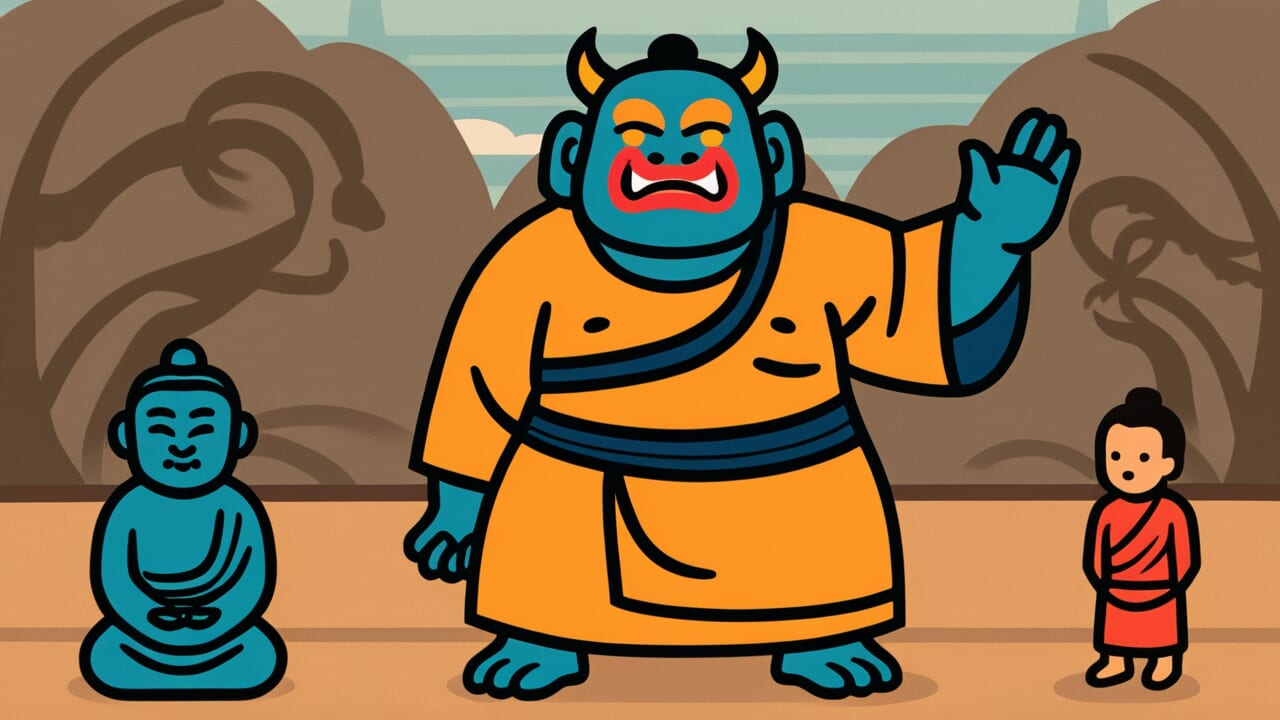How to Read “A familiar demon over an unknown Buddha”
Shiranu hotoke yori najimi no oni
Meaning of “A familiar demon over an unknown Buddha”
This proverb means that a familiar bad person is more reliable than an unknown good person.
No matter how noble and kind someone is, if you have no connection with them, it’s hard to rely on them when you need help.
On the other hand, even if someone has a difficult personality or a bad reputation, if you know them well, they’re more likely to help you in times of trouble.
This proverb shows that in human relationships, actual trust and closeness matter more than someone’s reputation or surface-level goodness.
You might use this saying when advising someone to consult a familiar friend rather than a respectable stranger. It’s also useful when explaining the importance of everyday relationships.
This proverb acknowledges the gap between ideals and reality. It shows a practical approach to building human connections.
Origin and Etymology
The exact literary origin of this proverb is unclear. However, its structure offers interesting insights.
The proverb contrasts two opposing figures: Buddha and demon. This contrast expresses a surprising truth about human relationships.
Buddha symbolizes compassion and goodness. Demons, on the other hand, have been portrayed as frightening and evil. Naturally, anyone would want to rely on someone Buddha-like.
But this proverb flips that common sense on its head.
The contrast between “unknown” and “familiar” is equally important. No matter how admirable someone is, if you don’t know them, you can’t judge their character or trustworthiness.
Meanwhile, even if someone has flaws, a long relationship means you understand their personality and behavior patterns.
In Edo period commoner society, relationships based on geography and blood ties formed the foundation of life. When trouble came, people relied on those they knew from daily interactions.
A familiar friend proved more helpful than a respectable stranger. This proverb likely emerged from this practical life wisdom.
This expression reflects the Japanese practical view of human nature. It values reality over idealism.
Usage Examples
- When you’re struggling at a new workplace, “a familiar demon over an unknown Buddha” – it might be faster to consult a senior from your previous company
- Rather than a well-regarded expert, “a familiar demon over an unknown Buddha” – let’s ask the neighbor who always helps us out
Universal Wisdom
Humans are fundamentally creatures who feel more comfortable with the known than the unknown.
This proverb offers deep insight. It shows that trust in relationships comes not from moral perfection, but from predictability and mutual understanding.
Why do we rely on flawed acquaintances over admirable strangers? Because humans fear uncertainty above all else.
No matter how kind someone appears, whether they’ll actually help you and how they’ll react remains unknown. With familiar people, even if they have faults, you understand their behavior patterns.
This predictability is the source of comfort and trust.
Furthermore, this proverb speaks to the reciprocity of human relationships. Obligations and feelings built through long association create stronger bonds than surface-level kindness.
We choose imperfect companions over perfect strangers because humans instinctively value shared time and experiences.
Our ancestors understood this truth. What truly helps in life isn’t an ideal person, but companions with whom you’ve spent time and shared weaknesses.
Intimacy over perfection, reality over ideals. This is the universal wisdom that supports human society.
When AI Hears This
This proverb represents sophisticated risk calculation that humans perform unconsciously.
In game theory, situations where you can’t read the other person’s moves are called “incomplete information games.” An unknown person creates exactly this situation.
Even if they seem nice, you have zero data on how they’ll actually behave. This makes calculating expected value impossible.
What’s interesting here is how extremely humans dislike “variance” – the range of possible outcomes. The familiar demon might be mean, but past data lets you predict “how mean.”
In other words, you can anticipate the worst-case scenario. Meanwhile, the unknown Buddha might be a saint or might be truly evil.
This “unknowability” creates significant stress for humans.
Behavioral economics research shows that people tend to choose certain losses over uncertain ones with the same expected value.
For example, between “definitely losing 1,000 yen” and “50% chance of losing 2,000 yen or 50% chance of no loss,” most people choose the former.
Choosing the familiar demon follows this exact psychological mechanism.
In other words, this proverb puts into words a rational risk-avoidance strategy. Humans prioritize information “certainty” over information “quantity.”
Lessons for Today
This proverb teaches modern people the importance of investing in relationships.
We tend to rush toward connecting with more talented or more admirable people. But what truly matters is deepening relationships with people already around you.
Rather than seeking perfect people, spend time nurturing trustworthy relationships with imperfect ones.
Small daily interactions, helping each other in difficult times, sharing joys and sorrows. These accumulations create bonds you can rely on when it counts.
In modern society, superficial connections through social media may increase while truly reliable relationships decrease.
That’s why this proverb’s wisdom shines brightly. Wide online networks matter, but cherish deep real-world relationships.
The slightly quirky people around you, the imperfect ones. Relationships with such people become life’s treasures.
Rather than chasing ideals, carefully nurture the connections you have now. That’s the path to a truly rich life.



Comments